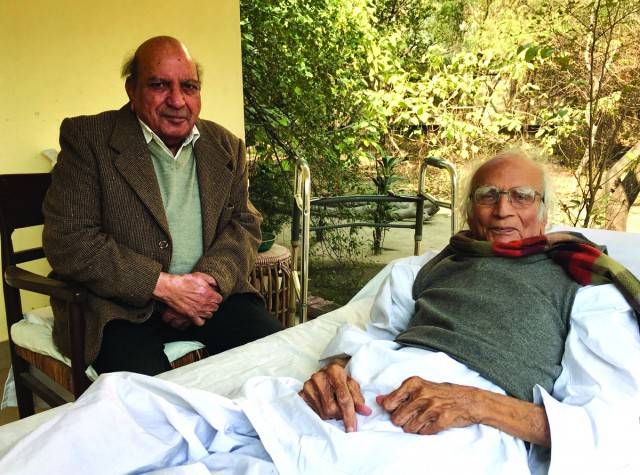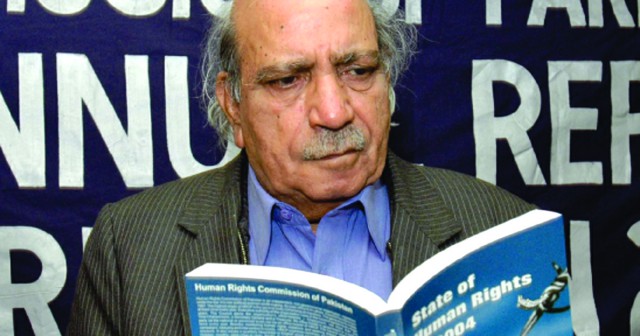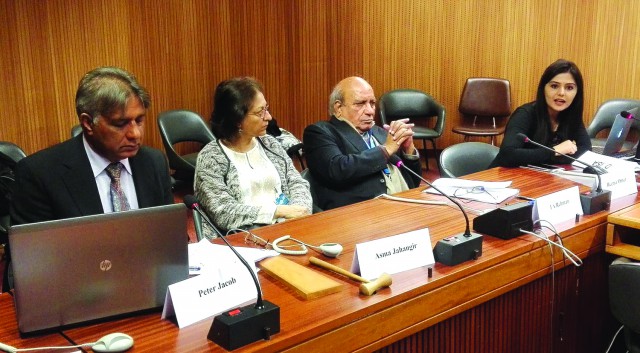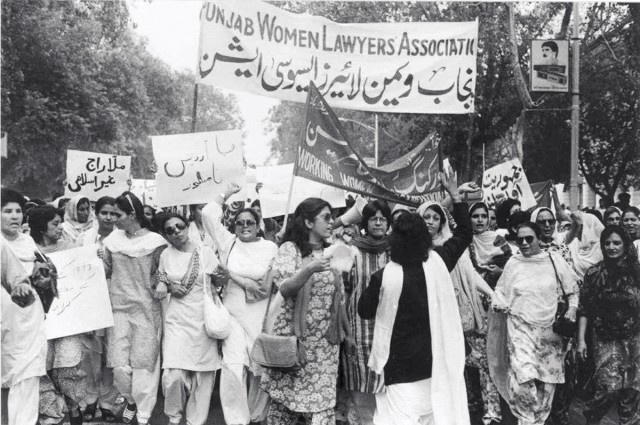
The outpouring of countrywide grief on the passing away of I A Rehman – or Rehman sahib as he was known in South Asia – is a reflection on the thousands of lives that he touched in his remarkable life of 91 years. His erudition, humanity, humility, passion for the voiceless, astounding memory, optimism in face of adversity, intellect, wit and that sparkle in his eyes has been articulated by many, but what made him special was that he himself made everyone he met feel special. Through this, he created an inexplicable bond that somehow remained forever. Everyone has a personal story with Rehman sahib. So here is mine.
Rehman sahib was born in September 1930 in Hassanpur district Karnal in then Punjab (now Haryana). His father, a lawyer, later settled in nearby Palwal where Rehman sahib grew up. According to him, his first journalistic/political awakening happened when at the age of seven, wrapped in a razaai, he was put in a tanga. The tanga then kept moving on and on, and young Rehman fell asleep gazing at the stars. When he woke it was morning and he had reached Panipat, hometown of my late Uncle Dr Mubashir Hasan. Thus began an association that lasted over eighty years.

Rehman sahib’s father had come to help run the election campaign of Khwaja Sarwar Hasan, a Cambridge-returned barrister, who was running on a Muslim League ticket for a Punjab provincial assembly seat reserved for Muslims. The visit must have made an impression on young Rehman sahib, as he vividly remembered it, including the communal riots and the fact that Muslim League lost. (In fact, Muslim League won only 1 seat out of 175 in the whole of Punjab, with the Unionist party winning the majority with 95 seats).
After completing his matriculation from Palwal he was sent to Aligarh Muslim University, but could not complete his studies due to financial problems and Partition in 1947.
Partition proved traumatic: as the family migrated to Pakistan, the convoy was attacked and looted by mobs. Barely 200 mainly young children and women survived out of a convoy of 2,000 souls. Understandably, as he found the memories painful, Rehman sahib seldom talked about this incident, but never held a grudge; visiting Palwal several times. The one time that he did give an interview to my cousin Fizza Hasan of Theaterwaley, a progressive theatre group, they turned that interview into a play about the trauma of Partition called Dagh Dagh Ujala (after Faiz’s poem). The protagonist Rehman sahib was portrayed in the role of Taashman: a person whiling away time by playing cards, while anxiously waiting for news about his family.

Although most of his family settled in Multan, Rehman sahib continued his studies at Islamia College and later Government College, where he graduated in physics from Punjab University. By his own acknowledgement, his main education was in the Punjab Public Library where he read copiously. A committed Marxist, Rehman sahib wrote for several urdu newspapers before regularly contributing articles for the Pakistan Times (PT).
Later he received an offer of full-time employment with PT as their Films and Theatre critic. Given his interest in culture, he developed close associations with all the leading poets including Faiz Ahmed Faiz. In PT he moved on as assistant editor under the formidable Mazhar Ali Khan and helped make PT editorially the gold standard for English newspapers in the subcontinent. In the mid-1960s, Progressive Papers Limited, the owner of PT, was taken over by the government. Rehman sahib’s own labour union activism and Marxist values did not sit well with the new owners, so in 1970 he, along with 130 others of the same ideology, were sacked from the newspaper.
With the gratuity and provident funds he received from PT, Rehman sahib, Abdullah Malik and Hameed Akhtar started an Urdu newspaper that they called Azad, with Rehman sahib as the editor. This burnished his credentials, as one of the top journalist of his time, as Azad became immensely popular within space of a few months, with circulation shooting from 10,000 to over 80,000. Azad was one of the few newspapers that had correctly called the 1970 elections – with Awami League sweeping in East Pakistan and PPP in West Pakistan. Azad was also one of the few newspapers to openly oppose the military action, stating that it would forever alienate the people of East Pakistan. A victim of its own success, unfortunately the growth in revenue (mainly advertisements from the government) in Azad did not match the growth in expenses (paper, staff etc) with the result that the newspaper ran out of money and had to fold – the owners losing most of their investment.

Fortunately for Rehman sahib, Zulfikar Ali Bhutto’s PPP government was amenable to restoring the sacked PT workers and in 1972 he re-joined in his old position. But by 1974 he was uneasy in journalism, whether it was his passion for films and culture or that he felt a growing divergence with ZAB’s policies that prompted him to leave. His friend Hussain Naqi had been arrested by Bhutto for publishing a pamphlet that espoused the leftist ideology. Regretfully I never explored that. In any case, Rehman sahib joined the National Film Development Corporation (NAFDEC) under the aegis of Faiz sahib, a position that he continued to hold until the coup of 1977, when he left.
Mazhar Ali Khan his old editor from PT days had started the weekly Viewpoint in 1976, that he essentially funded. Upon his return from NAFDEC, Rehman sahib was offered the role of executive editor there, which he accepted and worked at Viewpoint for over ten years. Here, despite General Zia-ul-Haq’s severe censorship, they still managed to publish important political articles. The early Zia days were oppressive and dark for all progressive journalists: police barged into Rehman sahib’s house on Temple Road. He was arrested and sent to jail.
It was during his Viewpoint days that Rehman sahib together with Dawn bureau chief Nisar Osmani became the brain trust for the progressive movement in Pakistan. In Lahore of the 1980s, despite Zia’s criminal regime, hope sprang eternal. Cynicism was at an ebb and cries of “Benazir Aygee Inqilab Layige” (“Benazir will return, she will bring revolution”) echoed on the streets. Rehman sahib’s desk at Viewpoint became the cornucopia of ideas for aspiring activists who wished to change the world. Then everyone assumed that their home telephones were bugged, so face-to-face meetings to bounce off ideas with Rehman sahib and seek his guidance became de rigueur . WAF activists Asma Jehangir, Hina Jillani, Khawar Mumtaz and Fareeda Shaheed. Politicians Dr Mubashir Hasan, Aitizaz Ahsan and the late Salman Taseer. Performing artists Madeeha Gohar, Sarwat Ali, Shoaib Hashmi and Saleema Hashmi. Then budding writers Najam Sethi, Rashid Rehman, as well as Ahmed Rashid and Ayaz Amir (both of whom wrote for Viewpoint). A substantial portion of strategy and ideas for WAF, MRD, Ajoka and even seeds for HRCP convalesced around Rehman sahib’s wisdom and optimism.
The reporter instinct never left Rehman sahib. Twice I remember accompanying him and Dr Mubashir on MRD protest marches. On one occasion we rescued a lady who was lying shot in the leg on the street and took her to Fatima Jinnah hospital. At another demonstration, upon hearing that there were casualties, he insisted on going to Mayo Hospital mortuary where the body of a 16-year-old PPP worker shot by the police had been kept. That night we visited the victim’s house for condolences – the scene still haunts me.
With the success of the WAF movement in countering Zia’s extremism and discrimination against women, Asma Jehangir and others wanted to highlight all forms of discrimination. But that required a platform and structure, other than the legal assistance that she was already providing. Rehman sahib and Aziz Siddiqui were the cavalry that were called in to help set up what would become the Human Rights Commission of Pakistan (HRCP). Asma owned two flats at Main Market, one flat was made into an office with a room for desks Rehman sahib’s and Aziz Siddiqui’s desks, while the other became office-cum-guest house for out-of-town visitors. Rehman sahib helped write the charter and put in place adequate governance clauses such as periodic elections, as well as country-wide and provincial representations to create a robust organization. The organization was formally launched in 1987. If Asma was the captain of the HRCP ship, then Rehman sahib and Aziz Siddiqui were the engine. Later after Aziz Siddiqui passed away, Rehman sahib became HRCP’s sole propellant.
With the swearing-in of Benazir’s government in 1988, Aitzaz Ahsan persuaded Rehman sahib to become the editor of Pakistan Times, a duty that he undertook with typical professionalism: criticising the PPP government whenever justified. Upon dissolution of the PPP government, with HRCP on a securer financial footing, Asma with some prodding by Dr Mubashir persuaded Rehman sahib and Aziz Siddiqui to accept full-time positions with HRCP, a role they continued to play until their deaths. HRCP became their life, and they became HRCP’s life.
Rehman sahib’s 30-plus years of contribution to HRCP and for human right advocacy in general is well documented and vouched for by thousands of participants and beneficiaries. He never shied away from participating in public interest litigating around social or environmental issues. Despite the depressing situation in Pakistan for human rights and religious discrimination, Rehman sahib always maintained a positive attitude, imparting zeal and energy into his mission. Only once did Rehman sahib momentarily loose his normal optimistic attitude, when his nephew Rashid Rehman, the Multan-based lawyer, was killed by an extremist for defending a university professor accused of blasphemy.
The Pakistan India Forum for Peace and Democracy (PIPFPD) was the brainchild of Dr Mubashir Hasan, but the only person he trusted to run the organization again was Rehman sahib. The initial meeting was held in Lahore in 1990, but was formalized as a regular forum in 1994, holding regular meetings in various cities of both India and Pakistan. Other than genuinely promoting harmony in 2002, PSPFPD played an important part in diffusing a potential military crisis between the two countries. His influence was such that today Indian activists such as Tapan Bose and Syeda Hameed mourn for Rehman sahib in the same way as us. Rehman sahib also formed the South Asia Human Rights Organization (SAHR).
Rehman sahib’s newspaper articles and three books are an encyclopaedia for anyone who wishes to understand the state of human rights, religious and ethnic discrimination, or simply the encroachment of the state on the rights of ordinary citizens. He was never in pursuit of fame, money or influence. He toiled because of his principles and what he thought was right. When journalists were offered residential plots by the Musharraf government, Rehman sahib turned it down saying “I write against this usurper, how can I accept any material gain from him?” When the Chief Justice Saqib Nisar offered him tea, he politely said “I have come here for justice, not to have tea.” When Razia Bhatti was starting Newsline she sent him a cheque for an article he wrote. He returned it saying, “I will bill you once you’ve made a million.” But above all, Rehman sahib was a humanist. He never abandoned old friends: when Dr Mubashir was sick for over two years, despite his frail health, whenever in town Rehman sahib would visit him 5 or 6 days a week.
At the HRCP office in Karachi, I once asked my friend Dr Sahr Attaullah as to why she worked there. “Out of love and respect for three people,” she said - Asma Jehangir, Rehman sahib and Dr Mubashir sahib. Within a space of three years, all three of them are gone.
With the passing away of Rehman sahib, as a nation our intellectual rigour to examine religious, ethnic and gender discrimination, as well as our moral backbone to fight for human rights and peace, - has been seriously depleted. So we, his admirers, weep over his loss inconsolably.
Rehman sahib was born in September 1930 in Hassanpur district Karnal in then Punjab (now Haryana). His father, a lawyer, later settled in nearby Palwal where Rehman sahib grew up. According to him, his first journalistic/political awakening happened when at the age of seven, wrapped in a razaai, he was put in a tanga. The tanga then kept moving on and on, and young Rehman fell asleep gazing at the stars. When he woke it was morning and he had reached Panipat, hometown of my late Uncle Dr Mubashir Hasan. Thus began an association that lasted over eighty years.

Rehman sahib’s father had come to help run the election campaign of Khwaja Sarwar Hasan, a Cambridge-returned barrister, who was running on a Muslim League ticket for a Punjab provincial assembly seat reserved for Muslims. The visit must have made an impression on young Rehman sahib, as he vividly remembered it, including the communal riots and the fact that Muslim League lost. (In fact, Muslim League won only 1 seat out of 175 in the whole of Punjab, with the Unionist party winning the majority with 95 seats).
After completing his matriculation from Palwal he was sent to Aligarh Muslim University, but could not complete his studies due to financial problems and Partition in 1947.
Partition proved traumatic: as the family migrated to Pakistan, the convoy was attacked and looted by mobs. Barely 200 mainly young children and women survived out of a convoy of 2,000 souls. Understandably, as he found the memories painful, Rehman sahib seldom talked about this incident, but never held a grudge; visiting Palwal several times. The one time that he did give an interview to my cousin Fizza Hasan of Theaterwaley, a progressive theatre group, they turned that interview into a play about the trauma of Partition called Dagh Dagh Ujala (after Faiz’s poem). The protagonist Rehman sahib was portrayed in the role of Taashman: a person whiling away time by playing cards, while anxiously waiting for news about his family.

Although most of his family settled in Multan, Rehman sahib continued his studies at Islamia College and later Government College, where he graduated in physics from Punjab University. By his own acknowledgement, his main education was in the Punjab Public Library where he read copiously. A committed Marxist, Rehman sahib wrote for several urdu newspapers before regularly contributing articles for the Pakistan Times (PT).
Only once did Rehman sahib momentarily lose his normal optimistic attitude: when his nephew Rashid Rehman, the Multan-based lawyer, was killed by an extremist for defending a university professor accused of blasphemy
Later he received an offer of full-time employment with PT as their Films and Theatre critic. Given his interest in culture, he developed close associations with all the leading poets including Faiz Ahmed Faiz. In PT he moved on as assistant editor under the formidable Mazhar Ali Khan and helped make PT editorially the gold standard for English newspapers in the subcontinent. In the mid-1960s, Progressive Papers Limited, the owner of PT, was taken over by the government. Rehman sahib’s own labour union activism and Marxist values did not sit well with the new owners, so in 1970 he, along with 130 others of the same ideology, were sacked from the newspaper.
With the gratuity and provident funds he received from PT, Rehman sahib, Abdullah Malik and Hameed Akhtar started an Urdu newspaper that they called Azad, with Rehman sahib as the editor. This burnished his credentials, as one of the top journalist of his time, as Azad became immensely popular within space of a few months, with circulation shooting from 10,000 to over 80,000. Azad was one of the few newspapers that had correctly called the 1970 elections – with Awami League sweeping in East Pakistan and PPP in West Pakistan. Azad was also one of the few newspapers to openly oppose the military action, stating that it would forever alienate the people of East Pakistan. A victim of its own success, unfortunately the growth in revenue (mainly advertisements from the government) in Azad did not match the growth in expenses (paper, staff etc) with the result that the newspaper ran out of money and had to fold – the owners losing most of their investment.

Fortunately for Rehman sahib, Zulfikar Ali Bhutto’s PPP government was amenable to restoring the sacked PT workers and in 1972 he re-joined in his old position. But by 1974 he was uneasy in journalism, whether it was his passion for films and culture or that he felt a growing divergence with ZAB’s policies that prompted him to leave. His friend Hussain Naqi had been arrested by Bhutto for publishing a pamphlet that espoused the leftist ideology. Regretfully I never explored that. In any case, Rehman sahib joined the National Film Development Corporation (NAFDEC) under the aegis of Faiz sahib, a position that he continued to hold until the coup of 1977, when he left.
Mazhar Ali Khan his old editor from PT days had started the weekly Viewpoint in 1976, that he essentially funded. Upon his return from NAFDEC, Rehman sahib was offered the role of executive editor there, which he accepted and worked at Viewpoint for over ten years. Here, despite General Zia-ul-Haq’s severe censorship, they still managed to publish important political articles. The early Zia days were oppressive and dark for all progressive journalists: police barged into Rehman sahib’s house on Temple Road. He was arrested and sent to jail.
It was during his Viewpoint days that Rehman sahib together with Dawn bureau chief Nisar Osmani became the brain trust for the progressive movement in Pakistan. In Lahore of the 1980s, despite Zia’s criminal regime, hope sprang eternal. Cynicism was at an ebb and cries of “Benazir Aygee Inqilab Layige” (“Benazir will return, she will bring revolution”) echoed on the streets. Rehman sahib’s desk at Viewpoint became the cornucopia of ideas for aspiring activists who wished to change the world. Then everyone assumed that their home telephones were bugged, so face-to-face meetings to bounce off ideas with Rehman sahib and seek his guidance became de rigueur . WAF activists Asma Jehangir, Hina Jillani, Khawar Mumtaz and Fareeda Shaheed. Politicians Dr Mubashir Hasan, Aitizaz Ahsan and the late Salman Taseer. Performing artists Madeeha Gohar, Sarwat Ali, Shoaib Hashmi and Saleema Hashmi. Then budding writers Najam Sethi, Rashid Rehman, as well as Ahmed Rashid and Ayaz Amir (both of whom wrote for Viewpoint). A substantial portion of strategy and ideas for WAF, MRD, Ajoka and even seeds for HRCP convalesced around Rehman sahib’s wisdom and optimism.
At the HRCP office in Karachi, I once asked my friend Dr Sahr Attaullah as to why she worked there. “Out of love and respect for three people,” she said - Asma Jehangir, Rehman sahib and Dr Mubashir sahib. Within a space of three years, all three of them are gone
The reporter instinct never left Rehman sahib. Twice I remember accompanying him and Dr Mubashir on MRD protest marches. On one occasion we rescued a lady who was lying shot in the leg on the street and took her to Fatima Jinnah hospital. At another demonstration, upon hearing that there were casualties, he insisted on going to Mayo Hospital mortuary where the body of a 16-year-old PPP worker shot by the police had been kept. That night we visited the victim’s house for condolences – the scene still haunts me.
With the success of the WAF movement in countering Zia’s extremism and discrimination against women, Asma Jehangir and others wanted to highlight all forms of discrimination. But that required a platform and structure, other than the legal assistance that she was already providing. Rehman sahib and Aziz Siddiqui were the cavalry that were called in to help set up what would become the Human Rights Commission of Pakistan (HRCP). Asma owned two flats at Main Market, one flat was made into an office with a room for desks Rehman sahib’s and Aziz Siddiqui’s desks, while the other became office-cum-guest house for out-of-town visitors. Rehman sahib helped write the charter and put in place adequate governance clauses such as periodic elections, as well as country-wide and provincial representations to create a robust organization. The organization was formally launched in 1987. If Asma was the captain of the HRCP ship, then Rehman sahib and Aziz Siddiqui were the engine. Later after Aziz Siddiqui passed away, Rehman sahib became HRCP’s sole propellant.
With the swearing-in of Benazir’s government in 1988, Aitzaz Ahsan persuaded Rehman sahib to become the editor of Pakistan Times, a duty that he undertook with typical professionalism: criticising the PPP government whenever justified. Upon dissolution of the PPP government, with HRCP on a securer financial footing, Asma with some prodding by Dr Mubashir persuaded Rehman sahib and Aziz Siddiqui to accept full-time positions with HRCP, a role they continued to play until their deaths. HRCP became their life, and they became HRCP’s life.
Rehman sahib’s 30-plus years of contribution to HRCP and for human right advocacy in general is well documented and vouched for by thousands of participants and beneficiaries. He never shied away from participating in public interest litigating around social or environmental issues. Despite the depressing situation in Pakistan for human rights and religious discrimination, Rehman sahib always maintained a positive attitude, imparting zeal and energy into his mission. Only once did Rehman sahib momentarily loose his normal optimistic attitude, when his nephew Rashid Rehman, the Multan-based lawyer, was killed by an extremist for defending a university professor accused of blasphemy.
The Pakistan India Forum for Peace and Democracy (PIPFPD) was the brainchild of Dr Mubashir Hasan, but the only person he trusted to run the organization again was Rehman sahib. The initial meeting was held in Lahore in 1990, but was formalized as a regular forum in 1994, holding regular meetings in various cities of both India and Pakistan. Other than genuinely promoting harmony in 2002, PSPFPD played an important part in diffusing a potential military crisis between the two countries. His influence was such that today Indian activists such as Tapan Bose and Syeda Hameed mourn for Rehman sahib in the same way as us. Rehman sahib also formed the South Asia Human Rights Organization (SAHR).
Rehman sahib’s newspaper articles and three books are an encyclopaedia for anyone who wishes to understand the state of human rights, religious and ethnic discrimination, or simply the encroachment of the state on the rights of ordinary citizens. He was never in pursuit of fame, money or influence. He toiled because of his principles and what he thought was right. When journalists were offered residential plots by the Musharraf government, Rehman sahib turned it down saying “I write against this usurper, how can I accept any material gain from him?” When the Chief Justice Saqib Nisar offered him tea, he politely said “I have come here for justice, not to have tea.” When Razia Bhatti was starting Newsline she sent him a cheque for an article he wrote. He returned it saying, “I will bill you once you’ve made a million.” But above all, Rehman sahib was a humanist. He never abandoned old friends: when Dr Mubashir was sick for over two years, despite his frail health, whenever in town Rehman sahib would visit him 5 or 6 days a week.
At the HRCP office in Karachi, I once asked my friend Dr Sahr Attaullah as to why she worked there. “Out of love and respect for three people,” she said - Asma Jehangir, Rehman sahib and Dr Mubashir sahib. Within a space of three years, all three of them are gone.
With the passing away of Rehman sahib, as a nation our intellectual rigour to examine religious, ethnic and gender discrimination, as well as our moral backbone to fight for human rights and peace, - has been seriously depleted. So we, his admirers, weep over his loss inconsolably.

